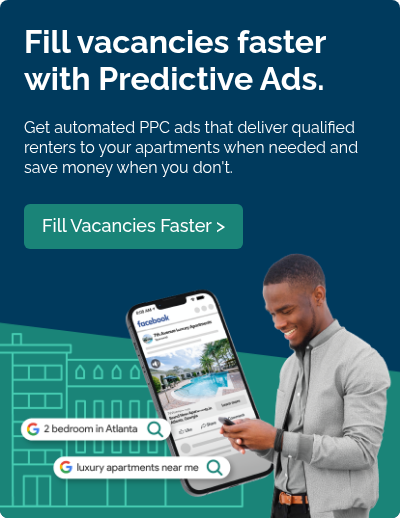Today’s renters begin their apartment search online—yes, that’s not exactly breaking news.
But here’s what should break your leasing strategy: Your apartment community isn’t ranking in Google.
If you’re not showing up in the first few results, it’s like your community doesn’t even exist.
Renters search for terms related to your name, location, amenities, pet policies, floorplans, and price. And if you’re not discoverable at that moment? You’re losing leases.
That’s why SEO—Search Engine Optimization—is essential. In this guide, we’ll show you why SEO matters for apartments and how to improve your community’s visibility where it counts most: search.
What is Apartment SEO?
Apartment SEO is the process of improving your community’s visibility in the search engine results page (SERP) so renters can easily find you online—whether they’re searching by name, location, or specific amenities.
The ultimate goal for apartment SEO? When a prospect searches for your apartment community by name in Google, you've accomplished the SEO triple-threat, ensuring no prospect misses you:
- The top paid search listing
- The top organic search result
- And the top local business listing
The pathway toward the top in each category is what apartment SEO is all about.
Let's break down what it takes to earn and maintain strong visibility for your apartments in each.
How Does Apartment SEO Work?
Improving Your Apartment Website's Organic Search Rankings
It’s no accident we’re starting here.
Improving your website's organic search presence can revolutionize your apartment’s leasing performance—because organic traffic is 100% free!
Imagine the impact on your marketing and revenue if prospective renters could easily find your community without you paying for every click.
But earning those top organic rankings takes work. Here’s where to focus:
1. Establish a community-specific website.
You need a standalone site for your apartments—not just a landing page on a corporate site—to build domain authority and rank for specific, relevant searches.
2. Prioritize fast load times and great user experience.
Renters (and Google) expect your website to load quickly, work smoothly on any device, and make it easy for them to find floorplans, prices, and availability.
3. Meet Google’s Core Web Vitals standards.
From how your media files are sized and formatted to how your pages are structured, technical SEO factors like website page speed and mobile responsiveness matter for rankings.
4. Optimize page titles and meta descriptions.
Make sure each page’s title and meta description clearly reflect its content—and include your community’s name and location so search engines clearly connect each page to you.
5. Write authentic, renter-focused messaging.
Help renters make decisions by addressing their needs in clear, easy-to-read language. Skip the fluff—search engines reward content that's clear and actually helps.
6. Use specific and location-driven keywords.
Thoughtfully include search terms renters actually use on your website—especially a complete list of your amenities and anything tied to your apartment's neighborhood, like nearby attractions, major employers, or schools.
Okay, are you still here?
Like we said, it's a lot! And that's just the surface level of apartment SEO.
Winning with Your Local Business Listing
The local business listing section of the SERP focuses on your apartment community’s Google Business Profile (GBP)—and any great apartment SEO strategy must focus on it.
Your GBP, if properly utilized, can become your best free lease generator. In our study of over 88,000 apartment leases, we found that the GBP page attributed to 25,138 leases—second only to community websites.
Renters trust the local business section. It’s where they quickly verify your name, location, contact details, ratings, reviews, and more.
To win here:
- Claim and verify your Google Business Profile.
- Fill it with accurate, helpful information and fresh media.
- Update it frequently to maintain trust and accuracy.
Maintaining your GBP isn’t just about branded search results—it’s also about standing out in Google Maps, where renters search for apartments nearby.
Your SEO strategy impacts your Google Maps visibility, too. Don’t overlook it.
Supporting Your SEO Efforts with Paid Search Ads
This is where SEO and SEM (Search Engine Marketing) intersect—right at the top of the results page.
To earn this paid spot, your apartments need a strong Google Ads strategy for your apartments that targets the right keywords—specifically, the ones prospective renters actually use when searching for communities like yours.
The process for showing up here doesn’t look all that different from SEO. You still want to:
- Match your apartments' ads to the exact search terms renters are using,
- Write headlines and descriptions that speak directly to renter needs,
- Stand out from similar properties in your area,
- And drive traffic to a website that helps them—otherwise, you’re wasting your budget.
So while digital ads work differently than organic or local listings, the foundation is the same: understand what renters are searching for, and show up with the right message at the right time.
And here’s the bonus—your SEO efforts actually improve your paid ads.
A fast, well-structured, renter-focused website not only ranks better organically, it can also boost your apartments' Google Ads performance by improving your Quality Score, lowering your cost-per-click, and increasing conversion rates.
Why Does Apartment SEO Matter?
If it’s not clear already—apartment SEO is vital.
On one hand, it makes your community easier to discover. When renters search for apartments that match your location, price point, or amenities, strong SEO helps you show up at that critical moment.
On the other hand, SEO impacts more than just visibility—it shapes the user experience on your website.
Many apartment marketers overlook this technical side. But when your site’s code, content, and messaging aren’t built with SEO in mind, it’s harder to rank well…and that makes it harder to lease.
Apartment SEO matters because it affects the entire leasing experience—from the first Google search to the first tour.
If your website doesn’t show up in relevant apartment searches online, load fast, or help renters make a decision, you’re losing leases before they even reach out.
Can I Do Apartment SEO on My Own?
Yes—most apartment marketers can manage key parts of their SEO strategy on their own.
For example, you can:
- Regularly update and maintain your Google Business Profile,
- Thoughtfully include relevant keywords in your website messaging and ad campaigns,
- And ensure your content answers the basic questions renters ask when searching online.
But some parts of SEO—especially the technical aspects of your website—are more complex.
If your site wasn’t built with SEO in mind, it’s worth partnering with a multifamily website vendor who understands how things like Core Web Vitals, site speed, mobile responsiveness, and structured data affect search performance.
What Tools Support My Apartment's SEO Strategy?
Here are some essential tools to help you implement your apartment community's SEO strategy—and ensure it's working to improve your online visibility.
1. Keyword Research Tools
To improve your visibility in search results, you need to know which terms prospective residents actually use when looking for apartments like yours.
Tools like Google Keyword Planner, SEMrush, and Moz help you:
- Discover high-value, location-based keywords
- See what phrases people are searching beyond just your community’s name
- Evaluate keyword competition and track your current rankings
This is how you move from guessing to knowing—which ultimately helps you write better website copy and run more effective ad campaigns.
2. Google Search Console
Google Search Console will help you understand how your apartment website is performing in organic search.
With it, you can:
- See which search terms are driving traffic to your site
- Identify top-performing and underperforming pages
- Catch any technical SEO issues
It’s a free, powerful tool—and one of the easiest ways to maintain control over how Google sees your site.
3. Google PageSpeed Insights
Site speed matters—for both renters and search rankings.
Use Google PageSpeed Insights to see how your website measures up with Core Web Vitals. It also provides a technical SEO report that highlights issues with load times and image formatting for both mobile and desktop.
4. Google Analytics 4 (GA4)
After renters find your site, what happens next?
Google Analytics 4 lets you monitor how renters engage with your website and its content—so you can measure whether your SEO strategy is actually working.
How Do I Budget for Apartment SEO?
SEO can be expensive—and it’s often hard to know the upfront cost.
The key thing to remember? SEO isn’t a quick fix— it's a long-term investment. Use the tools above or conduct an SEO audit to understand what's actually wrong with your apartment's current SEO setup.
If your apartments have bigger issues—like a slow, outdated website—simply hiring an SEO vendor won’t instantly increase your organic search results. You need a full strategy that addresses both your website’s performance and your online visibility.
How is Apartment SEO Changing?
Apartment SEO has always been about making sure renters can easily discover your community when they search online.
Now, as AI tools like ChatGPT, Gemini, and Perplexity become more common, renters are starting to search for apartments beyond just traditional search engines.
You’ll likely hear people say, “SEO is dead." But that couldn’t be further from the truth.
In fact, your efforts to make your apartment community discoverable in Google search will directly influence how often it appears in these large language model (LLM) search experiences, too.
Here’s how LLMs are evolving apartment SEO:
1. Apartment Searches Are Becoming More Personal and Conversational
AI tools are changing how renters conduct their search.
Instead of typing simple keyword phrases like “1-bedroom apartments downtown Kansas City,” renters now ask much more specific, natural questions like:
"What are some highly-rated apartments near downtown Kansas City that allow labs and have a swimming pool?"
AI tools provide personalized answers—and apartments that meet those criteria, with strong SEO, are more likely to be included.
That said, unlike traditional search engines, not every AI result will lead to a direct click to your website—so focusing on building a strong online presence from your apartment's SEO efforts will be even more important.
2. Clear Content Will Matter Even More
The structure and clarity of your apartment website directly affect whether AI tools can find and pull your community into their answers.
This goes back to technical SEO—ensuring your website loads fast, is easy to navigate, and presents information in a clear, organized way.
Both search engines and AI models prioritize content they can easily understand and trust.
3. Local SEO Efforts Will Stay Critical
When renters use AI to search for available apartments by location, LLMs pull data directly from trusted local sources like Google Maps and Google Business Profiles.
Maintaining your GBP with up-to-date information, accurate amenities, photos, and reviews is just as important now as it was before AI entered the picture.
If you're not visible and trusted locally, you won’t show up in conversational AI results either.
Final Takeaway: Apartment SEO is evolving beyond just keywords. To win in an AI-driven world, apartment marketers must focus on building a website that's fast, works on any device, and contains accurate information, as well as prioritize their local listings. Those fundamentals won’t change—no matter how the search landscape evolves.
Conclusion
Apartment SEO is complex. You may need help in some aspects, especially with your website. Make it a priority to present information about your apartment community with a discoverable, user-friendly, and mobile-responsive website.
But there are other aspects you can control, like supporting your SEO efforts with digital ads and managing your highly-visible and trusted local sources like Google Business Profile.
The main goal of any apartment SEO strategy is to be both discoverable everywhere renters search while building credibility and authority with them, too.



